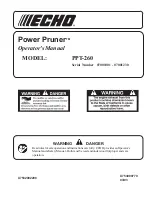
5 ENGLISH
7.
Use extra caution when sawing into existing
walls or other blind areas.
The protruding blade
may cut objects that can cause kickback.
8.
ALWAYS hold the tool firmly with both hands.
NEVER place your hand, leg or any part of your
body under the tool base or behind the saw,
especially when making cross-cuts.
If kickback
occurs, the saw could easily jump backwards over
your hand, leading to serious personal injury.
9.
Never force the saw. Push the saw forward at a
speed so that the blade cuts without slowing.
Forcing the saw can cause uneven cuts, loss of
accuracy, and possible kickback.
Guard function
1.
Check the guard for proper closing before
each use. Do not operate the saw if the guard
does not move freely and enclose the blade
instantly. Never clamp or tie the guard so that
the blade is exposed.
If the saw is accidentally
dropped, the guard may be bent. Check to make
sure that the guard moves freely and does not
touch the blade or any other part, in all angles and
depths of cut.
2.
Check the operation and condition of the
guard return spring. If the guard and the spring
are not operating properly, they must be ser-
viced before use.
The guard may operate slug
-
gishly due to damaged parts, gummy deposits, or
a build-up of debris.
3.
Assure that the base plate of the saw will not
shift while performing a "plunge cut".
Blade
shifting sideways will cause binding and likely kick
back.
4.
Always observe that the guard is covering the
blade before placing the saw down on bench
or floor.
An unprotected, coasting blade will cause
the saw to walk backwards, cutting whatever is in
its path. Be aware of the time it takes for the blade
to stop after the switch is released.
Additional safety warnings
1.
Intended use
This tool is specially intended for performing
plunge cuts. The tool is also intended for rip and
cross cuts. The tool is designed to cut wood,
aluminum, plastic, mineral contained plastic, and
similar materials.
Always use the appropriate
designated Makita saw blade for the materials
being cut. Use of incorrect blade may result in
kickback and personal injury.
2.
Use extra caution when cutting damp wood,
pressure treated lumber, or wood containing
knots.
Maintain smooth advancement of tool with-
out decrease in blade speed to avoid overheating
the blade tips and if cutting plastics, to avoid melt-
ing the plastic.
3.
Do not attempt to remove cut material when
blade is moving. Wait until blade stops before
grasping cut material.
Blades coast after turn off.
4.
Avoid cutting nails. Inspect for and remove all
nails from lumber before cutting.
5.
Place the wider portion of the saw base on
that part of the workpiece which is solidly
supported, not on the section that will fall off
when the cut is made. If the workpiece is short
or small, clamp it down. DO NOT TRY TO HOLD
SHORT PIECES BY HAND!
6.
Before setting the tool down after completing a
cut, be sure that the guard has closed and the
blade has come to a complete stop.
7.
Never attempt to saw with the circular saw
held upside down in a vise. This is extremely
dangerous and can lead to serious accidents.
8.
Some material contains chemicals which may
be toxic. Take caution to prevent dust inhala
-
tion and skin contact. Follow material supplier
safety data.
9.
Do not stop the blades by lateral pressure on
the saw blade.
10.
Do not use any abrasive wheels.
11.
Only use the saw blade with the diameter that
is marked on the tool or specified in the man
-
ual.
Use of an incorrectly sized blade may affect
the proper guarding of the blade or guard opera-
tion which could result in serious personal injury.
Summary of Contents for XPS02
Page 47: ...47 ...






































